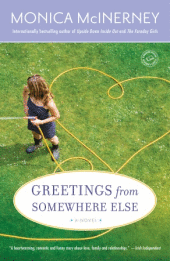 I once had the disconcerting experience of sitting on a bus beside someone reading one of my novels. It was the longest journey of my life. I don't think I breathed for the first hour. I read every word and every line with her. I had to dig my nails into my hands to stop myself asking, "Did you like that page?" "Was that joke funny enough?" "How are you enjoying it so far?" She's lucky I didn't get off at the same stop and follow her home.
I once had the disconcerting experience of sitting on a bus beside someone reading one of my novels. It was the longest journey of my life. I don't think I breathed for the first hour. I read every word and every line with her. I had to dig my nails into my hands to stop myself asking, "Did you like that page?" "Was that joke funny enough?" "How are you enjoying it so far?" She's lucky I didn't get off at the same stop and follow her home.I'm having that same feeling now, in the week that my new novel Greetings from Somewhere Else is published in the USA. It's the story of Lainey, an over-efficient event organizer who is wrenched from her Melbourne home to take charge of a run-down B&B in Ireland. Meanwhile, back home, her father's taken to his bed, her mother is up the walls, her three brothers are running amok, and her boyfriend is causing more problems than she could have imagined...
I live in Dublin, and unfortunately it's not going to be possible for me to trawl the transport systems of America in search of someone reading my book. That's why I love reading groups so much. Like all authors, I write in isolation, but I write for readers. I long to know if my stories have struck chords, if my characters have come to life. It's an honor, as exciting as it is nervewracking, to have the opportunity to talk either by phone or in person with a group of readers who have given my book their time, energy and thought. It's a special feeling to hear readers talk about my characters as though they are as real to them as they were to me.
I'm now a full-time author, spending my days juggling plot twists, researching locations, moving my characters from one family drama to another. Once a month, though, I join the real world and metamorphose into a full-time reader, heading into the centre of Dublin to meet with my own reading group.
In the four years our group of six women and two men have been meeting, we've read and passionately discussed classics, modern novels, non-fiction, poetry and memoirs, by writers from Ireland, Australia, America, Britain, Germany, France. I look forward to every meeting. I've been an avid reader since I was a child, and even now I average two or three books a week.
It was only after I joined the discussion group, however, that I realized how my life as a writer had changed me as a reader. Like a sorcerer's apprentice, I now had an inkling of the secrets behind the story, the techniques, the plotting, the characterization, the dialogue, the language. I was reading each book as if I was there beside the author.
It made my reading experience so much richer, but there was an unfortunate side-effect: I couldn't criticitize a novel, because I knew how hard it was to write one. If another group member found fault with a character or a plot twist or even a line of dialogue, I would spring to the author's defense. I must have been exasperating. "Have you ever read a book you didn't love?" one of them finally asked me. "There must have been something you didn't like about this one."
It was what I needed to hear, as a reader and as a writer. Because it made me think and finally articulate at the next meeting what I believe to be the truth and the magic of reading. No book is perfect. No author is perfect. No reader is perfect. People bring their own lives, theories, imperfections, hopes and dreams to every book they read, as every author brings all those qualities to each book she or he writes. Reading and writing are creative, challenging, ever-changing activities. No two people read the same book in the same way. One person may love every word of a book, another will loathe it. That's the magic of stories --- they somehow change shape in the hands of the many different people who read them.
I know my reading group experiences have helped me as a writer. I've heard passionate readers tell me what they long for in a book –--- heart, action, intelligence, humor. I've heard what they don't like in a book --- stilted dialogue, implausible plots, unlikeable characters. When I sit at my computer and start to invent my own fictional worlds, characters and lives, I no longer think of those voices as critical or negative. I think of them as future readers, cheering me on, encouraging me, reminding me to write from the heart, to mean what I say, to pour as much life and soul as I can into every page.
---Monica McInerney

